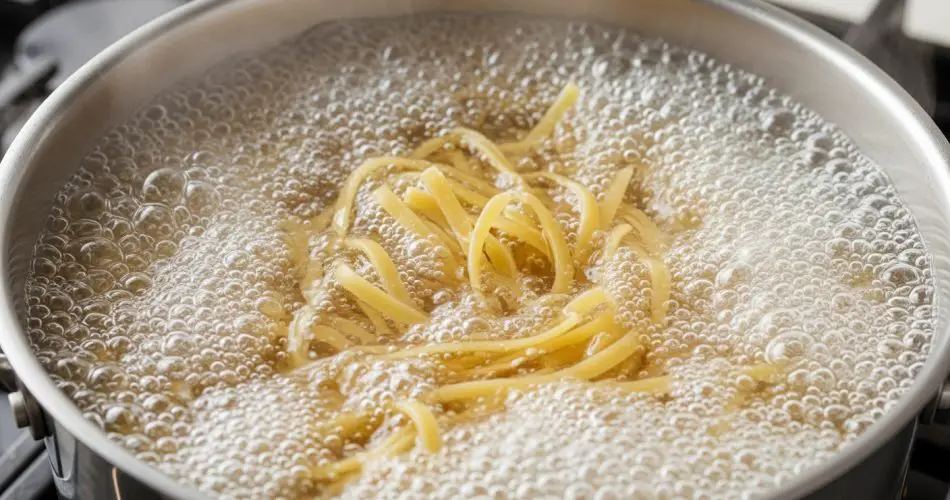For most of us, draining pasta water into the sink is a habit we’ve had for years. Whether it’s the water used to boil pasta, vegetables, eggs, or meat, we rarely think twice before dumping it down the drain. It seems completely harmless — but in reality, this common practice could be damaging your kitchen’s plumbing system more than you realize.
The problem lies not in what the water is, but in how hot it is and what it contains. Let’s break down why you should think twice before pouring boiling water into the sink, what kinds of risks it poses to your plumbing, and the simple trick to prevent costly damage.
The Hidden Danger of Boiling Water in the Sink
When you boil pasta, the water can reach temperatures exceeding 100°C (212°F). While your metal pot is designed to handle that heat, the same can’t always be said for your kitchen plumbing.
Your home’s drainpipes — especially in older houses — are often made of PVC (polyvinyl chloride) or other types of plastic that can soften or warp when exposed to high temperatures. Constantly pouring boiling water directly into the sink can cause the material to expand, weaken, or even crack over time.
Even if your pipes are made of metal, the problem doesn’t disappear entirely. The intense heat from boiling water can stress joints and seals, causing them to deteriorate prematurely. The rubber or silicone gaskets used to seal the connections between pipes are especially vulnerable to heat damage. Once these parts start to fail, you might notice small leaks that eventually lead to major plumbing repairs — and hefty bills.
Pasta Water: Not Just Hot, But Starchy
The water you use to cook pasta carries an additional problem beyond its temperature: starch. During cooking, pasta releases starch into the water, making it thick and cloudy. This starch can cling to the inner surfaces of your pipes, especially when combined with soap, grease, or food particles.
Over time, this sticky residue can build up, leading to clogs and slow drainage. When you pour boiling starchy water into the sink, the heat softens any existing residue inside the pipes — and when it cools, it solidifies again, forming a glue-like coating that’s difficult to remove.
The same goes for water used to cook rice, potatoes, or other starchy foods. What seems like a harmless liquid is actually a slow, silent enemy of your plumbing system.
The Real Risk: Thermal Shock and Seal Damage
Pipes and plumbing components are designed to handle water at normal household temperatures — usually between 10°C and 60°C (50°F–140°F). When boiling water is suddenly poured down the drain, it can cause thermal shock, especially if the pipes are cold (for example, during winter).
This extreme temperature difference can cause the pipes to contract and expand rapidly, stressing their joints and connections. Over time, this repeated process weakens the system, leading to small leaks that can turn into major plumbing emergencies.
Even worse, the gaskets and rubber seals used in many modern sink drains are highly sensitive to heat. When exposed to boiling water, they can melt, deform, or lose elasticity — causing water to seep out around the edges of the drain or under the sink.
The Right Way to Dispose of Pasta Water
If pouring boiling pasta water straight into the sink is harmful, what should you do instead? Fortunately, the solution is both simple and practical.
1. Cool the Water Before Draining It
After cooking your pasta, don’t immediately empty the pot into the sink. Let the water sit for 10–15 minutes so it cools slightly. You don’t need to wait until it’s cold — just until the steam subsides and it’s no longer scalding hot. This small delay can make a big difference in protecting your pipes and seals.
2. Run Cold Water While Draining
If you must pour the pasta water out immediately, run a steady stream of cold water from the faucet at the same time. The cold water will instantly reduce the temperature of the boiling liquid, minimizing the risk of thermal shock.
This simple trick helps balance the temperature and prevents damage to the pipes, fittings, and gaskets. Think of it as creating a “cushion” for your plumbing system.
3. Reuse Pasta Water Instead of Throwing It Away
Another great option is to reuse pasta water instead of discarding it. This water is rich in starch and can be surprisingly useful around the house. Here are a few ideas:
-
In cooking: The starchy water is perfect for thickening sauces or soups. Italian chefs often add a ladle of pasta water to pasta sauces to make them creamier and help them cling to the noodles.
-
For plants: Once cooled, pasta water (without salt) can be used to water plants. The minerals it contains can actually nourish your garden.
-
For cleaning: The warm, starchy liquid can help loosen grime from pots and pans. Use it while it’s still warm to pre-soak greasy dishes before washing them.
Everyday Tips to Protect Your Plumbing
Taking care of your plumbing doesn’t require complicated maintenance — just a few mindful habits:
-
Avoid pouring fats or oils down the drain. These solidify as they cool, causing blockages.
-
Don’t dispose of starchy or greasy cooking water directly. Let it cool and discard it elsewhere, such as in a compost bin.
-
Flush pipes regularly by pouring a pot of warm (not boiling) water mixed with vinegar and baking soda down the drain to dissolve minor buildup.
-
Check for leaks periodically, especially under the sink and around pipe joints. Early detection can save you from expensive repairs.
A Simple Habit That Saves You Money
These small precautions may seem trivial, but they can spare you from costly plumbing issues down the road. A burst pipe or damaged seal can easily result in hundreds of euros in repair bills—not to mention the inconvenience of being without a functioning sink for days.
By remembering to cool your cooking water or dilute it with cold water before pouring it down the drain, you’re not just protecting your pipes—you’re protecting your home and your budget.
Sometimes, the smallest changes in our daily routines can make the biggest difference. So the next time you finish cooking pasta, pause for a moment before heading to the sink. That pot of boiling water deserves a little more respect than you might think.



